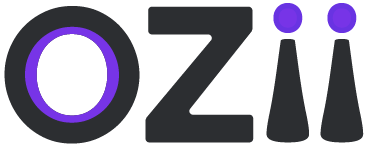
How to Ace Your Self-Evaluation: Writing Tips for Success

Introduction
Self-appraisals are an integral component of the HR performance appraisal process, allowing employees to evaluate their own performance and help develop their careers. A good self-appraisal offers a chance to highlight accomplishments, set areas for improvement, and link personal objectives with organizational goals. With proper planning, employees can use self-appraisals as a vehicle for personal and professional growth.
By utilizing organized frameworks such as OZii's HRMS software, staff members can effectively monitor progress, establish future objectives, and make sure their self-assessments are both effective and according to company standards. This tutorial will take you through the optimal practices in creating an effective self-evaluation and offer insight into how technology, such as human resource software, can simplify the process.
Why Self-Evaluations Are Important
A well-organized self-evaluation provides a number of advantages, such as:
Promoting Self-Assessment: Staff can accurately judge their own strengths and development needs.
Developing Professional Advancement: Assists in defining learning opportunities and career development objectives.
Improving Manager-Worker Communication: Facilitates frank discussions during appraisal time.
Assisting Resource Utilization: Guides HR departments in efficient allocation of training and development resources.
Facilitating Engagement: Encourages staff to embrace ownership of the role and proactive contribution to business outcomes.
Tips for Writing a Useful Self-Assessment
1. Be Objective and Honest
The key to a successful self-evaluation is honesty. While it is important to highlight accomplishments, employees should also acknowledge areas for growth.
Balance Strengths and Areas for Improvement: A realistic assessment shows self-awareness and a commitment to professional development.
Use Data to Support Claims: Leverage OZii’s performance tracking tools to provide quantifiable evidence of achievements.
Seek Constructive Feedback: Engage with peers or managers for insights that can help refine the self-evaluation.
2. Highlight Key Achievements
A compelling self-evaluation should clearly outline key accomplishments:
Use Measurable Results: Instead of saying, "I improved team collaboration," specify, "I initiated a new task management system that increased team efficiency by 20%."
Provide Real Examples: Showcase specific projects or initiatives where contributions had a significant impact.
Utilize HRMS Software: OZii’s HR appraisal tools provide data-driven insights into employee contributions.
3. Align with Organizational Goals
One of the best strategies for an impactful self-evaluation is to show alignment with company objectives:
Understand Business Objectives: Staff must look at their company's strategic objectives and align their accomplishments with the same.
Demonstrate Value: Emphasize how individual work has aided larger company projects.
Use Office Management Tools: OZii office management software allows staff to monitor and synchronize their tasks with company priorities.
4. Set SMART Goals
A strong self-evaluation not only reflects on past performance but also sets clear future goals.
Specific: Clearly define the goal.
Measurable: Use quantifiable metrics to track progress.
Achievable: Ensure goals are realistic and attainable.
Relevant: Align goals with personal and business objectives.
Time-bound: Set deadlines for achieving goals.
By utilizing OZii’s task management system, employees can track goal progression and adjust strategies accordingly.
5. Request Constructive Feedback
A self-evaluation is an opportunity for growth. Requesting constructive feedback from supervisors and colleagues helps employees:
Gain insights into areas they may have overlooked.
Foster open communication and collaboration.
Identify ways to improve their work performance.
Use OZii’s feedback tools for real-time feedback and continuous improvement.
Self-Evaluation as a Career Growth Tool
Beyond being a requirement for HR appraisals, a well-executed self-evaluation can serve as a valuable tool for career advancement.
Monitoring Career Development: Employees can track progress from previous self-assessments to gauge improvement over time.
Determination of Skill Gaps: A thorough analysis of performance identifies areas requiring more development.
Improving Visibility: A well-documented self-evaluation can assist employees in demonstrating the value they bring to upper management.
Taking Charge of Professional Development: Proactively establishing learning objectives shows initiative and commitment.
Frequent Pitfalls to Steer Clear of in Self-Evaluations
Even the most seasoned workers can err in composing self-assessments. These are some things to avoid:
1. Being Too Vague
Statements such as "I work diligently" or "I am a team player" are not descriptive enough. Instead:
Use concrete examples.
Give quantifiable outcomes.
Emphasize how effort relates to company goals.
2. Overlooking Weaknesses
A self-assessment need not be all about strengths. Employees should be honest about areas of improvement and provide an action plan to grow.
3. Not Aligning with Business Priorities
One frequent error is only highlighting personal successes without tying them to business success. Employees ought to:
Connect efforts to business results.
Demonstrate how they helped the organization achieve success.
Make use of human resource software to monitor efforts.
Taking Advantage of Technology for Self-Assessments
Modern HR technology simplifies the self-evaluation process. OZii’s HRMS software offers features that:
Automate Self-Assessments: Employees can complete structured evaluations with guided templates.
Eliminate Bias: Using data-driven performance metrics, OZii ensures fairness in reviews.
Integrate with Payroll Software: Aligning performance reviews with compensation decisions.
Provide Actionable Insights: AI-driven reports help employees understand their strengths and areas for growth.
Case Studies: How OZii Transformed Self-Evaluations
Case Study 1: Tech Firm Improving Employee Engagement
A mid-sized tech company faced low engagement during performance appraisals. By integrating OZii’s HRMS software, they:
Increased self-evaluation completion rates by 70%.
Enhanced transparency in performance tracking.
Strengthened communication between employees and managers.
Case Study 2: Retail Chain Boosting Employee Productivity
A leading retail brand struggled with inefficient performance reviews. After adopting OZii’s HR appraisal system, they:
Reduced evaluation bias by 50%.
Streamlined feedback collection.
Increased goal alignment across store locations.
Case Study 3: Healthcare Organization Enhancing Performance Assessments
A large healthcare provider needed a structured evaluation process for medical staff. With OZii’s task management tools, they:
Automated performance tracking for over 1,000 employees.
Improved efficiency in self-assessment analysis.
Increased accuracy in competency evaluations.
Future Trends in Self-Evaluations
The landscape of performance management is evolving. Future trends include:
AI-Driven Evaluations: Predictive analytics will refine self-evaluation insights.
Real-Time Feedback Loops: Continuous performance tracking instead of annual reviews.
Gamification of Performance Reviews: Incentives and rewards will encourage participation.
Personalized Learning Plans: AI-driven recommendations will enable workers to create tailored career paths.
Conclusion
A well-executed self-evaluation is a powerful tool for professional growth and career development. By leveraging OZii’s innovative HR tools, employees can create structured, data-driven self-assessments that contribute to both individual and company success. With goal-setting features, real-time feedback, and automation, businesses can ensure that self-evaluations become a meaningful part of their HR strategy.
By framing the self-assessment correctly, workers can make their self-evaluation a career success guide and make a strong case for advancing to future positions, promotions, and professional growth.
HRMS









